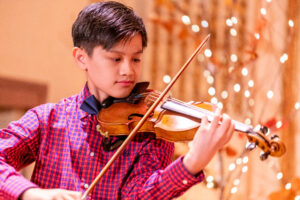 There’s More to Music Education than Playing Your Instrument
There’s More to Music Education than Playing Your Instrument
When we think of music education, the first thing that often comes to mind is learning to play an instrument. While mastering your chosen instrument is undoubtedly a crucial part of music education, there’s so much more to becoming a well-rounded musician. In this blog, we will explore how there’s more to music education than playing your instrument, such as engaging in performances, participating in recitals, joining chamber music groups, understanding performance etiquette and preparation, and attending music camps are all integral aspects of a comprehensive music education.
Performing: Beyond Practice
Performing is a critical component of music education. It provides an opportunity for students to showcase their skills and hard work. More importantly, performing in front of an audience helps build confidence and stage presence, which are essential for any musician. Whether it’s a solo performance, a group recital, or a school concert, every performance is a step towards becoming a seasoned musician.
Recitals: Showcasing Talent and Progress
Recitals offer students the chance to demonstrate their progress and achievements. These events are not just about playing perfectly but about sharing your musical journey with an audience. Recitals also teach valuable lessons in preparation, dealing with performance anxiety, and learning to recover gracefully from mistakes.
Chamber Music Groups: Band, Orchestra, and More
Playing in chamber music groups, such as bands or orchestras, is an invaluable experience. It teaches students how to listen to others, blend sounds, and play harmoniously as a unit. This collaborative environment fosters teamwork, discipline, and a deeper understanding of music. It also exposes students to a wider repertoire and various musical styles, enriching their overall musical knowledge.
Performance Preparation & Etiquette
Understanding performance etiquette is crucial for any musician. This includes knowing how to conduct oneself on stage, how to acknowledge the audience, and how to interact with fellow performers. Proper preparation, including rehearsing thoroughly, dressing appropriately, and being punctual, are all part of presenting a professional performance. These skills are not only important for music but are also transferable to other areas of life.
Participating in Music Camps
Music camps are a fantastic way for students to immerse themselves in a focused musical environment. These camps often offer intensive training, opportunities to perform, and the chance to meet and learn from other musicians. Participating in a music camp can be a transformative experience, providing inspiration and motivation to continue growing as a musician.
Music education is a multifaceted journey that extends far beyond simply learning to play an instrument. By engaging in performances, participating in recitals, joining chamber music groups, understanding performance etiquette and preparation, and attending music camps, students gain a holistic music education. These experiences not only enhance their musical abilities but also teach important life skills such as teamwork, discipline, and confidence. So, embrace all aspects of music education and watch your musical journey flourish.
For more information on music education opportunities, including recitals, music camps, and chamber music groups, visit our website and explore the many ways you can enrich your musical education journey, such as the following performance opportunities…
